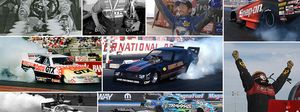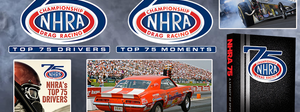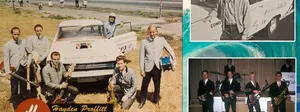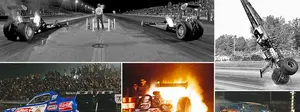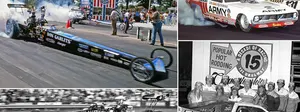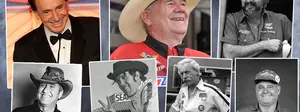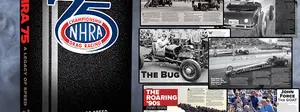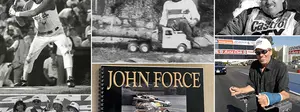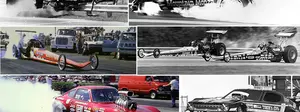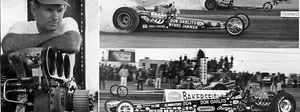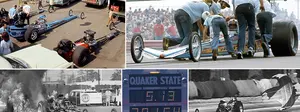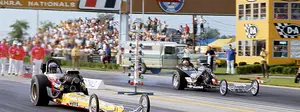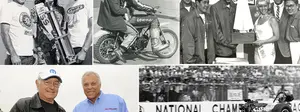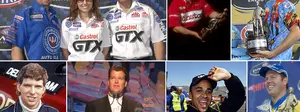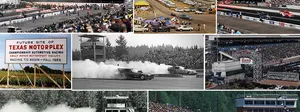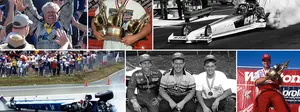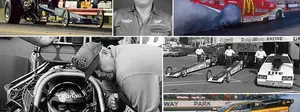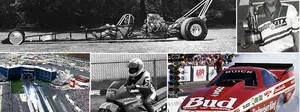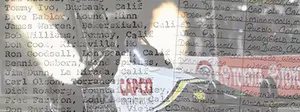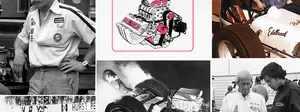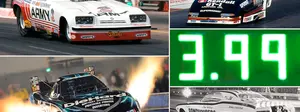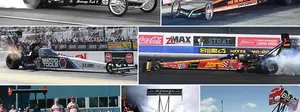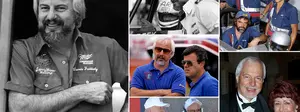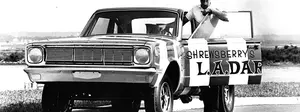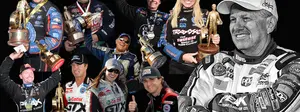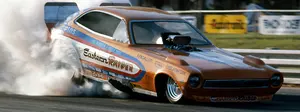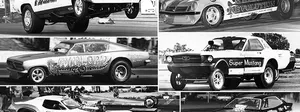On my radar screen ...
During a typical workweek, I am bombarded with interesting stuff, either by phone or e-mail. Whether it's feedback or additional info from a previous Insider column or just a helpful racer or fan directing me to an interesting Web site or passing on a cool photo, sometimes some of this stuff is just too cool to keep to myself.
As the calendar switches from September to October, it's time to clear out the backlog of intriguing stuff that I've accumulated in the last month. Enjoy!
I sent Shirley Muldowney a copy of Steve Heuer's photo of her in the cockpit of her ill-fated Satellite Funny Car (from this column), noting the early-model firesuit shown in the pic, and asked her how much racing had changed over the years. I found her reply both interesting and informative and, from someone with her vast experience and cred, spot on.
"They were so different that to draw a comparison between the two is kinda ridiculous, but I'll give it a shot," she said. "Now the cars don't seem to hike the front end up (both wheels; on a good run; the 1970 cars ran on three wheels to the 1,000-foot mark); drivers' hands don't have to leave the steering wheel to shift into another gear at half-track; drivers doesn't straddle a Lenco; we didn't have throttle stops to regulate the burnout rpm; smart drivers relied on an oil-pressure gauge only; and fire bottles have grown considerably larger in size."
 |
And she was just getting warmed up …
Shirley also offered this then versus now list:
- Real firesuits versus "Reynolds Wrap"
- Full-face helmets
- Coaches with radio headsets
- Superior track lighting
- Prepared track surfaces
- Super speedways (surface, length, width)
- Extended runouts versus cornfields
- Longer wheelbase
- State-of-the-art engine and running gear components
- Fuel pumps that live longer than two runs
- Front and rear wheel brakes
- Larger dual Kevlar parachutes
- Guardwall versus guardrail (or none at all)
- Testing
- 90 percent nitro versus 100 percent
- Bathrooms and showers
- Hotels instead of sleepers
- Airplanes reservations versus toll booths
- Kenworths versus Dodge duallies
- Alan Johnson versus Freddie DeName
"I rest my case," she concluded.
It's amazing sometimes how far we have come and how soon we forget the types of equipment that the pioneers of our sport used. We, the jury of the Insider Nation, find for Ms. Muldowney in the case of Then versus Now.

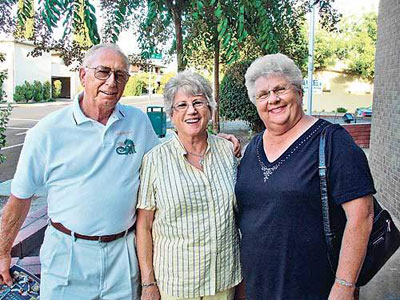 |
Speaking of Shirleys, Wally Parks NHRA Motorsports Museum presented by Automobile Club of Southern California curator and historian Greg Sharp (who, with Bret Kepner, always keeps me honest here) passed along a copy of a nice article on Shirley Shahan in the Visalia (Calif.) Times Delta newspaper. Shahan (now Shirley Bridges) had been officially named to the Visalia Riverway Sports Park Pillars of Fame in a unanimous vote by the Visalia Parks and Recreation Commission. The Pillars of Fame is the Visalia version of a sports Hall of Fame. That's Bridges, center, with husband Ken and close friend Marian Cote.
The article noted that she often is confused with another Shirley. "Yes, for the umpteenth time, I am not Shirley Muldowney," said Bridges, whose career largely did not intersect with Muldowney's as she retired in 1972, just as Muldowney was beginning her rise to greatness. (You can read my past column on Shahan's exploits -- parts of which were noted in the newspaper article -- here).

 |
My recent Four-wide mania column drew a lot of fond remembrances and thank-yous from those fortunate enough to have witnessed those spectacles firsthand. Dan Lemons dropped me a line to fess up to being the soul brave enough to be the starter at Fontana Drag City when they ran the four jet dragsters side by side.
"I was the foolhardy guy standing in front of the four flamethrowers with a flag in my hand," he admitted. "Even with the firesuit on, I got burned on the back of my neck and ankles, but I wouldn't have missed it for the world. All us old guys have left are the memories." Indeed!
Lemons now owns Lemons Headers in Paso Robles, Calif. I checked out his Web site and found it functional yet lacking a little pizzazz, so to thank him for his contribution to today's column, I propose he adopt one of the following slogans for his business: "Get Some Sour Power!" or "Lemons Headers: We'll squeeze more power from your engine" or "Lemon-aid for your horsepower woes" or, my favorite, "Be the top e-lemon-ator with Lemons Headers!" Dan: Contact me to discuss the terms of licensing these wonderful sayings <g>.

 |
Insider reader Jack "J.R." Hodson wanted to know the identity of the four Funny Cars shown in the pic at right, which I had found cruising some bulletin boards, but the photo was so small I couldn’t really help him. "Looks like an Opel Kadett farthest from the camera, then a somewhat-looking Candies & Hughes 'Cuda, a somewhat-looking USA 1 Camaro, and then a Buick Skylark or possibly Nova closest to the camera," he offered. I told him not to fret, that I was sure that the Insider Nation soon would give us the answer, and, sure enough, they did.
Not only did I get the answer, but I got it from one of those involved, Ron Pellegrini. "It was 1968, and the four cars were Jack Ditmars with the Mini Brute, Pat Minick with the Chi-Town Hustler, the Out of Sight Camaro (cannot remember the driver), and myself with my Beware Buick. I remember the day well as I crashed on a later run … slow roll and 173 on the roof through the lights, but that's another story."
"Hey do I get a Dewey button or a brownie point for getting the four manufacturers correct?" inquired Hodson (obviously showing his age) after I passed along Pellegrini's response.
Old pal Chase Knight also responded with more details about four-wide racing in Florida that helped round out the picture down South. "The Miami-Hollywood track did have four actual racing lanes in its final incarnation," he wrote. "The original push-down road to the west (left) of the original dragstrip was widened to accommodate two proper lanes and had its own Tree and timers. The 'new' track had about 1,000 feet less shutoff than the primary track and was used for the slower cars. All the lanes were used at the same time, but not usually with any attempt to start all four vehicles together."

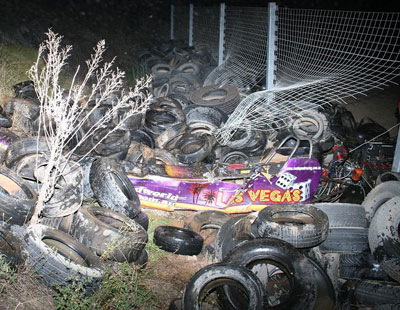 |
Mike Korpi sent this sad photo of the former Gary Clapshaw Spirit of Las Vegas Top Fueler in a heap Down Under. Korpi was one of the original crewmembers who helped Lonnie Strode build this car in 1999 for Clapshaw. This car holds a couple of places in history as it not only was the car that Clapshaw drove to a stunning U.S. Nationals runner-up in 2000 but also was the car that "Big Daddy" Don Garlits drove in Indy the following year when he ran his first four-second and 300-mph passes. This accident apparently took place a year ago at Western Sydney Dragway.
"I found these pics surfing the other day, and I am sick at what has happened to it," wrote Korpi. "I had more than 60 hours in just polishing the roll cage. What a waste. I am devastated. I am still crying."
Turns out that the car was owned by Aussie favorite Steve "Pommie" Read, who had the throttle hang open on his final qualifying pass. "I slid my foot out of the pedal to try and pull the throttle off, but no hope; by this time, I knew I wasn't going to stop," he posted on his Web site. "The car was on full throttle for 7.35 seconds, and on overlaying the data we recovered on our fastest run, we saw it was quicker than the at pass. At 300 mph, you travel at over 450 feet per second; after the finish line, you have about four seconds at that speed before the track ends and you are in the sand. Approaching the end of the track and still having to use two hands on the wheel, I thought, 'This is going to be BIG!' When suddenly the fuel ran out, the throttle unjammed, and I got the chutes out; by this time, I was almost in the kitty litter. I concentrated on keeping the car dead straight so as to go in head first, with approximately 15 feet of car in front of me to act as a crumple zone, I had to hope that was enough. At the last second, I pulled my hands off the wheel, and then a mighty WHOOMP, and the car stopped dead. My first thought was, 'That was not too bad,' and then the fuel tank exploded, and the fire came into the cockpit. I had no pain apart from my left hand, so with it getting a little hot in the car, I got out over the front of the car and trod straight into a tyre full of water. By this time, the rescuers had arrived, and they were all falling about in the tyres as well, which I thought was quite funny!"

 |
Speaking of cars in pieces, good friend Dave Wallace Jr., responding to Steve and John Bell's impressive collection of drag racing flotsam and jetsam in an earlier column, passed along this funny photo of him and his pals at the 1988 U.S. Nationals, where Brad Tuttle had vaporized the body of his Nitro Brandt Thunderbird in the lights.
"The nose fit so nicely onto this rent-a-rocket that I was able to drive it back to my Indy hotel from the track," he noted.
From left are veteran lensman and Lions Dragstrip historian Don Gillespie, Dave Wallace Sr. and Jr., and Jeff Burk (pre-Drag Racing Online). Dave Jr.'s brother, Sky, shot the photo and also "subsequently chopped the nose into five suitcase-friendly souvenirs with his always-handy Dremel tool," noted his proud brother. Sweet!

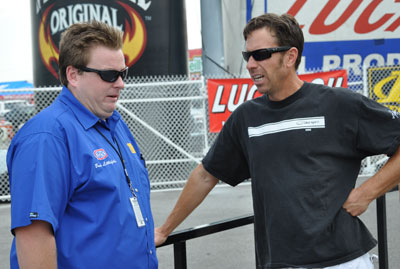 |
Speaking of second generations, on a little more modern note, former National DRAGSTER Editor and frequent Insider contributor Bill Holland passed along this photo he took recently of current ND Associate Editor Brad Littlefield, left,, and former ND Associate Editor Todd Veney, with the subject line Sons of the Old Pioneers.
"Nope, not the old country western singing group," Holland noted. "I snapped this picture of Brad Littlefield and the Toddster chatting at Indy. Obviously, they are sons of two prominent Alcohol Funny Car pioneers."
Brad's father, of course, is Mert Littlefield, of Littlefield Superchargers fame and and a longtime alcohol and nitro Funny Car driver. Todd's dad is the talented Ken Veney, cylinder-head wizard and a former nitro and alcohol flopper ace. Both of their sons have followed them into the cockpits, Brad licensing impressively in Dad's car and Todd boldly starting his own operation from the ground up and driving for others in a promising career that netted a divisional win in Columbus, where he left on and beat Frank Manzo (not that he has the photo of that final round as his desktop wallpaper on his laptop or anything), as well as three national event runner-ups.
Much to their dismay, neither has a ride, which might explain Veney's reaction to the photo that I forwarded to him: "From the look on our faces, I'd say it was from when Brad and I were discussing whether either one of us will ever drive a race car again."

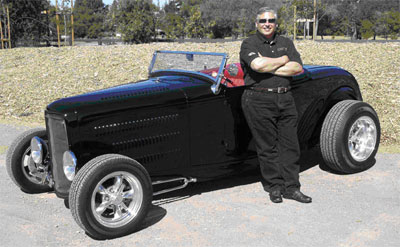 |
Hey, who doesn't love a good road trip, right? I mean, you, the open road, some good tunes, and your favorite hot rod. For many of us, it's heaven. But I doubt that any of us would have dared embark on the road trip that Dave Schaub took recently. He set out in his his Roy Brizio-built '32 Ford Model A roadster to see if he could visit all 49 states in the continental United States in nine days to raise money for Ronald McDonald House to help terminally ill children. It was an ambitious plan that would have him cover 9,800 miles in 216 hours.
He launched from Needles, Calif., Sept. 8, headed for Tulsa, Okla., then to the deep South until the Florida panhandle, then up the Eastern seaboard to Buffalo, N.Y., then back west. His biggest day notched 12 states, and even when he reached the West Coast again and Washington, his journey wasn't over. He had to head up north through British Columbia to reach the small town of Hyder in southeast Alaska.
Schaub kept a time-stamped receipt for gasoline and other items in each state he visited and used a GPS satellite device to allow Internet users to track his progress in real time on Google Maps through his Web site, www.49in9.com. He even made it to Hyder ahead of schedule, completing the trip in 8 days, 16 hours, and 48 minutes. I am certifiably impressed.



